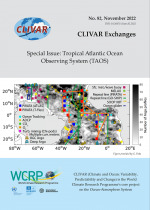The ICPO has been very active in promoting CLIVAR science and activities for the scientific community in China. The ICPO staff have already visited several Chinese institutions http://www.clivar.org/news/icpo-visits-chinese-institutions.
Last week, the ICPO hosted Prof. Detlef Stammer, SSG co-chair, and this...


























